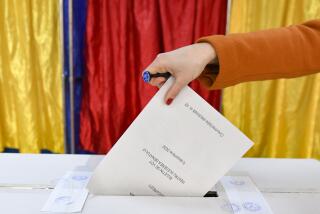Stakes are huge in Malaysian election
NEW DELHI — Malaysia faces its most significant election in decades Sunday, as voters choose between the longtime ruling coalition touting its steady hand and an untested opposition alliance promising economic and political reforms.
The stakes are huge as the old guard digs in, analysts say, fanning fear among its traditional Muslim base that national security, the economy and Islam’s central role will be undercut if a more diverse opposition takes power. Malaysia’s population is about 60% ethnic Malay Muslim, 25% ethnic Chinese and 15% ethnic Indian.
Most polls say the election outcome is too close to predict. Many analysts in the Southeast Asian country, which gained independence from Britain in 1957, cite growing discontent with half a century of one-party rule among its 13 million voters.
“This is an important election because it’s the first real chance to have a vibrant two-party system with all the implications,” said Azmi Sharom, a law professor at Kuala Lumpur’s University of Malaya. “What we’ve seen is that the civil service, police, feel beholden to one political party rather than to the government of the day.”
Prime Minister Najib Razak heads the ruling coalition’s reelection bid. He has presented himself as a progressive leader at the helm of the majority United Malays National Organization party trying to guide the nation in the 21st century.
The ruling party has presided over average economic growth of 6.5% from 1957 to 2005, in line with its stated goal of turning Malaysia into an industrialized country by 2020. But growth has slowed in recent years, declining to about 5% in 2012.
The ruling coalition’s argument that its solid record of building the nation over decades and shepherding solid economic growth plays best in rural areas among ethnic Malays who have most benefited from its affirmative action programs in education, government appointments and state contracting.
Leading the opposition effort is former deputy prime minister Anwar Ibrahim, nominal head of the opposition Pakatan Rakyat alliance, who has vowed to tackle corruption and nepotism, among other issues. Anwar was jailed for six years starting in 1998 on sodomy and corruption charges, which supporters say were a transparent government bid to sideline him politically.
The opposition is strongest among younger, better-educated, social-media-savvy urban Chinese, Malays and Indians who are wary of traditional ethnically divisive politics and feel that greater meritocracy is needed to take the economy to the next level, analysts said.
“The younger generation and first-time voter will be crucial in this election,” said Norani Othman, a sociology professor at the National University of Malaysia. “Most older urban voters in established government and private sector jobs say it’s going to be very difficult to decide. They’re fed up with the incumbent government but they don’t have confidence in the [opposition], which hasn’t convinced them they’re well prepared.”
Also key will be civil servants, who make up 10% of the voting rolls and in many cases are wary of Anwar’s reform agenda. To help cement loyalty, the government has handed out bonuses over the last year to bureaucrats.
“The civil service is basically a job for life,” said James U.H. Chin, head of the Malaysian campus of Australia’s Monash University. “And it’s the most bloated in the region.” Bureaucrats make up an estimated 4.3% of Malaysia’s total population compared with 1% to 2% for the rest of Southeast Asia, he said.
If Najib loses and presides over his party’s first defeat, it is likely to spark a ruling party leadership fight that could end his career. Najib, 59, the son of Malaysia’s second prime minister and the nephew of its third, is something close to ruling party royalty.
If the opposition loses, Anwar, 65, has vowed to retire. This could end his bid to mount a political comeback after his steep fall from grace as deputy national leader and could lead to the dissolution of the coalition he’s forged of pro-reform ethnic Chinese and liberal Islamic parties.
The election has been hard fought, with Najib and Anwar campaigning tirelessly, and with some supporters using sharp elbows or worse. Police recorded 387 cases of election-related violence in the first three days of campaigning, which officially started April 20. This included clashes between machete-wielding supporters, arson and the use of gasoline bombs, resulting in some injuries.
Reports of election irregularities such as vote buying also have been widespread. Among the problems alleged by local media are shipments of “indelible ink” to military voting locations that in fact could be washed off, presumably allowing military personnel — who tend to side with the government — to vote repeatedly.
“There are so many red flags going into the election,” said Bridget Welsh, a political science professor at Singapore Management University. “There’s a question if it will be a free and fair election and how much cheating there is.”
The election watchdog group Malaysian Electoral Roll Analysis Project said Tuesday that 80% of voters registered in the state of Sabah had incomplete addresses.
In addition, Anwar has accused the government of flying at least 40,500 people in recent days on chartered flights from the Borneo states of Sabah and Sarawak to parts of the peninsular mainland to boost the government’s chances in of winning. The ruling coalition has denied the charges.
Tanvi Sharma in The Times’ New Delhi bureau contributed to this report.
More to Read
Start your day right
Sign up for Essential California for news, features and recommendations from the L.A. Times and beyond in your inbox six days a week.
You may occasionally receive promotional content from the Los Angeles Times.






